The neurobiology of dementia
- 1. Submitted by Christy Lyons July 18, 2014
- 2. Dementia is a name for progressive brain syndromes which affect memory, thinking, behaviour and emotion. Symptoms may include: - loss of memory - difficulty in finding the right words or understanding what people are saying - difficulty in performing previously routine tasks - personality and mood changes
- 3. Dr. Mason discussed AlzheimerÔÇÖs, a major type of Dementia in a Lab during Week 4. Dementia is a disease that affected 44.4 million people worldwide in 2013[1]. There is a new case of dementia somewhere in the world every 4 seconds [1]. The number of patients with dementia are expected to triple by 2050 [1].
- 4. - Dementia involves the loss of nerve cells. - Since there are nerve cells throughout the brain, the loss of nerve cells in different areas of the brain will affect individuals differently. - This presentation will focus only a couple of areas: the temporal lobe and the hippocampus. http://www.today.colostate.edu/story.aspx?id=9857
- 5. There are approximately 100 billion nerve cells or neurons in the brain. http://www.geek.com/geek-cetera/our- brains-forget-information-at-a-rate-of-1-bit- per-second-per-neuron-1308566/ http://www.alzheimers.org.uk/braintour
- 6. The temporal lobe is the portion of the cerebral cortex that: - recognizes faces - perceives (hearing, vision, smell) - understands language - has emotional reactions http://www.drzukiwski.com/brain-function/
- 7. The hippocampus is the part of the brain that allows us to make new, declarative memories: both semantic and episodic. Healthy Hippocampus (From Dr. MasonÔÇÖs Week 4 Video)
- 8. Describe the functions of the nervous system that are apparent or impaired in your example.
- 9. Brain cells are generally not replaced. As more and more brain cells die, the brain starts to shrink.
- 10. Impairments in the temporal lobe have been traced to AlzheimerÔÇÖs. People with damage to the temporal lobe suffer difficulties in face recognition and object recognition. Long- and short-term memory loss. Aggression The Temporal Lobe of a Dementia Patient (Week 4 ÔÇô Peggy Mason)
- 11. Damage to the hippocampus causes: - severe memory impairment - disorientation - it may also cause depression Healthy Hippocampus (Week 4) Hippocampus of Dementia Patient (Week 4)
- 12. The stream of information from the entorhinal cortex, through the dentate gyrus to the hippocampus is called the perforant path. The entorhinal cortex is one of the first areas of the brain to show signs of AlzheimerÔÇÖs disease. The entorhinal cortex is associated with self- localization as well as declarative memory.
- 13. Explain in detail the ways in which this course has allowed you to better analyze the events and phenomena around you.
- 14. My 97-year-old grandmother has had dementia for at least the last 7 years. She was a bookkeeper with an excellent memory.
- 15. Watching her deteriorate has had a profound impact on our family; particularly my mother. She has periods where she cannot recognize my sister-in-law or cousinÔÇÖs boyfriend whoÔÇÖve been around for the last 10 and 4 years, respectively. Less frequently, she doesnÔÇÖt know who me, my brother or even my mother and uncle are.
- 16. She will ask a question and 3 minutes later ask the same question and then 5 minutes later, repeat it again. (Short-term memory loss) While at the cottage, she will be angry that the family is there, because she is expecting company, but when sheÔÇÖs queried on who the company is she wonÔÇÖt recall. SheÔÇÖs forgotten that she sold the cottage to my mom and uncle 15 years ago. (Aggression and long-term memory loss)
- 17. One time, I was visiting with Nana and she asked me if my husband was stationed in St. John and if IÔÇÖd taken the trolley to see her. (Prosopagnosia) Explanation: She met my grandfather during WWII and they lived on the east coast. This course has helped me to understand more clearly the physiological changes occurring in my grandmother, why she is behaving the way she is, and hopefully be more empathetic.
- 18. [1] Dementia Statistics. AlzheimerÔÇÖs Disease International. Retrieved from: http://www.alz.co.uk/research/statistics [2] 3D Brain Ap produced by Cold Spring Harbor Laboratory DNA Learning Center. [3] Peggy MasonÔÇÖs The Neurobiology of Everyday Living Videos.

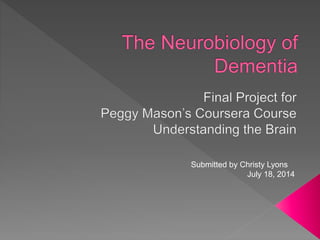
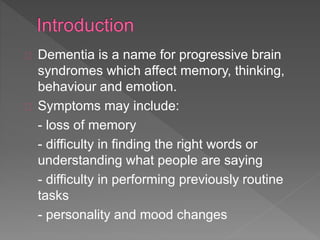
![Dr. Mason discussed AlzheimerÔÇÖs, a major
type of Dementia in a Lab during Week 4.
Dementia is a disease that affected 44.4
million people worldwide in 2013[1].
There is a new case of dementia somewhere
in the world every 4 seconds [1].
The number of patients with dementia are
expected to triple by 2050 [1].](https://image.slidesharecdn.com/theneurobiologyofdementia-140718094749-phpapp01/85/The-neurobiology-of-dementia-3-320.jpg)

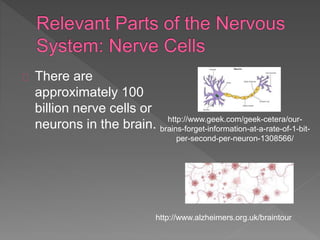
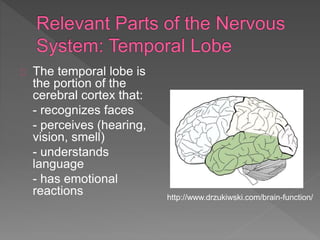
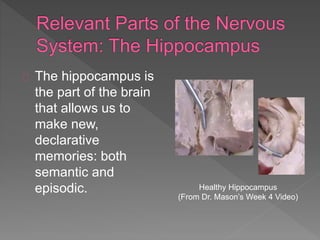
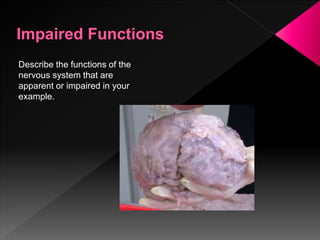
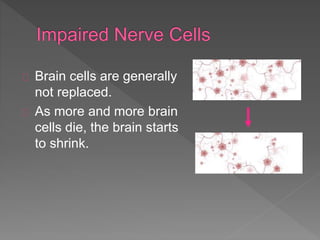
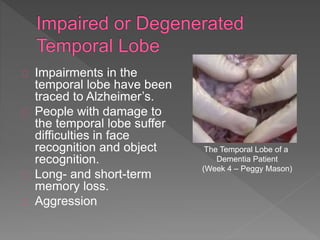

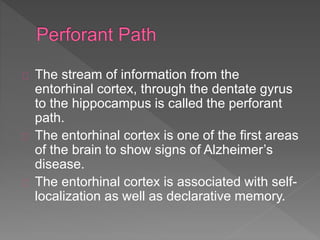
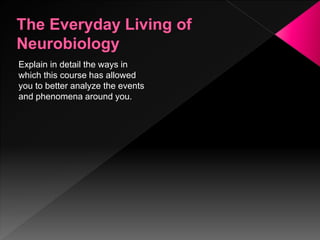
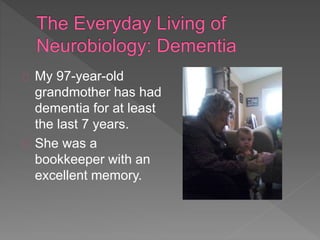
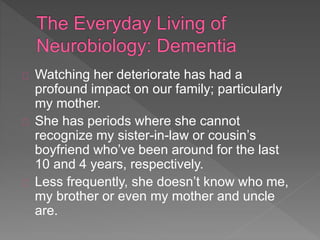
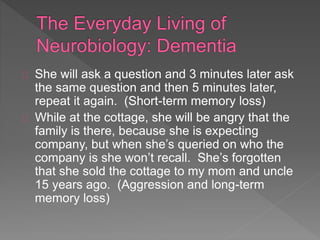
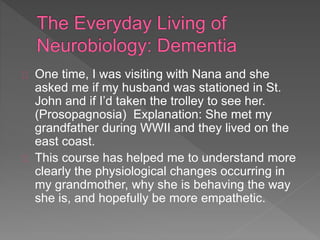
![[1] Dementia Statistics. AlzheimerÔÇÖs Disease
International. Retrieved from:
http://www.alz.co.uk/research/statistics
[2] 3D Brain Ap produced by Cold Spring
Harbor Laboratory DNA Learning Center.
[3] Peggy MasonÔÇÖs The Neurobiology of
Everyday Living Videos.](https://image.slidesharecdn.com/theneurobiologyofdementia-140718094749-phpapp01/85/The-neurobiology-of-dementia-18-320.jpg)